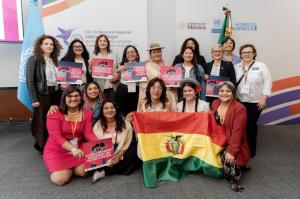Bolivia Passes Bill To End Child Marriage, Raising the Age of Marriage to 18 Without Exceptions
Approving the law that prohibits child marriage is a historic victory for the rights of girls and adolescents in Bolivia.”
BOLIVIA, September 18, 2025 /EINPresswire.com/ -- Bolivia has become the latest country in Latin America and the Caribbean to approve a law setting the minimum age of marriage at 18, without exceptions. On 17 September 2025, Bolivia’s Chamber of Deputies passed Bill No. 092-24, which amends Law No. 603 of the Family and Family Procedure Code and removes the exceptions that had allowed marriage from the age of 16. — Mónica Bayá, Legal Advisor
The passage of this bill is a decisive step toward ending child marriage, which is a harmful practice that has blighted the lives of countless girls and adolescents in Bolivia. The final step required is presidential promulgation for the prohibition to become definitive, marking a significant advance in protecting children’s rights and promoting gender equality.
Mónica Bayá, Legal Advisor at Equality Now and Technical Secretary of Comunidad de Derechos Humanos, explains: “Approving the law that prohibits child marriage is a historic victory for the rights of girls and adolescents in Bolivia. It eliminates the legal provisions that for years allowed thousands of girls to marry, and signals a renewed commitment to protect them from violence and harmful practices.”
CHILD MARRIAGE HARMS GIRLS
Child marriage is a serious human rights violation that can have devastating consequences. In Bolivia, and in many countries around the world, it often involves older men and younger girls. This age difference can create a substantial power imbalance in the relationship, giving the husband more authority, both socially and economically, and leaving young wives especially vulnerable to various forms of exploitation and abuse, including domestic and sexual violence, early pregnancy, and femicide.
Those who marry early are more likely to drop out of school due to pregnancy or the burden of domestic and unpaid care work. Limited access to education curtails their employment opportunities and reduces their chances of achieving financial independence, trapping many in cycles of poverty, abuse, and limited life choices.
Between 2010 and 2022, more than 11,000 adolescents between the ages of 13 and 17 were married in Bolivia, according to data from the Civil Registry Service. From 2014 to 2023 alone, 5,169 child marriages were registered, of which 4,804 involved girls aged 16 and 17 (92.93%), often with partners two or three times their age.
Child marriage is not a problem that is unique to Bolivia. In the United States, child marriage remains legal in 34 states, and between 2000 and 2018, nearly 300,000 minors were married in the US, with the vast majority (86%) being girls married to adult men.
A VICTORY FOR GIRLS AFTER YEARS OF ADVOCACY
The approval of Bolivia’s legal reform is the result of years of persistent advocacy by civil society organizations, women’s rights defenders, and international allies. In 2025, Equality Now supported local organizations in Bolivia that have been at the forefront of driving this initiative, including Comunidad de Derechos Humanos and Ipas Bolivia, who worked closely with Senator Virginia Velasco, the bill’s author, to provide legal and technical support throughout the legislative process.
As part of these efforts, Equality Now published a policy brief on legislative action to prohibit child marriage in Bolivia. The brief set out why reform was urgent, analyzed the harmful impacts of child marriage in Bolivia and across Latin America and the Caribbean, and offered concrete recommendations to bring Bolivia’s framework into alignment with international and regional human rights standards. It served as an advocacy tool to strengthen parliamentary debate and support approval of the law.
In April 2025, the Senate approved Bill No. 092-24, followed in August by the Human Rights Commission of the Chamber of Deputies. Despite some resistance rooted in harmful gender stereotypes - such as claims that girls as young as 13 or 14 were “ready to be wives” - women’s rights advocates persisted in pushing for positive change.
ENDING CHILD MARRIAGE REQUIRES EFFECTIVE LEGAL IMPLEMENTATION
The approval of the law is only the first step; eradicating child marriage requires much more than legislation. Effective implementation will be crucial and must go beyond a total ban, addressing the structural causes of child, early, and forced marriages and unions.
The true impact of this legal reform will depend on sustained commitment to its application and on an intersectional approach to support its effective implementation. It is now up to Bolivia’s Executive to promulgate the law and demonstrate that protecting the rights of girls and adolescents truly is a priority.
************************************************
Equality Now is a worldwide human rights organization dedicated to securing the legal and systemic change needed to end discrimination against all women and girls. Since its inception in 1992, it has played a role in reforming 120 discriminatory laws globally, positively impacting the lives of hundreds of millions of women and girls, their communities and nations, both now and for generations to come.
Working with partners at national, regional and global levels, Equality Now draws on deep legal expertise and a diverse range of social, political and cultural perspectives to continue to lead the way in steering, shaping and driving the change needed to achieve enduring gender equality, to the benefit of all.
Tamara Rusansky
Equality Now
+55 21 99966-3828
trusansky@equalitynow.org
Visit us on social media:
LinkedIn
Bluesky
Instagram
Facebook
YouTube
Legal Disclaimer:
EIN Presswire provides this news content "as is" without warranty of any kind. We do not accept any responsibility or liability for the accuracy, content, images, videos, licenses, completeness, legality, or reliability of the information contained in this article. If you have any complaints or copyright issues related to this article, kindly contact the author above.




